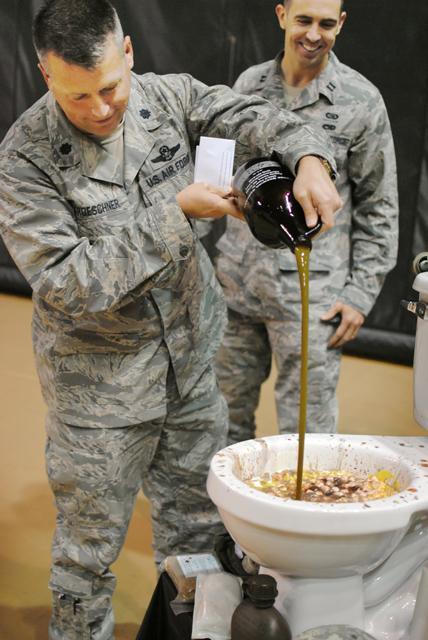Food fights, poetic duals and drinking chocolate-wasabi concoctions would be forbidden during a military banquet under normal conditions. But every year the Air Force ROTC detachment lets loose to celebrate the quirky traditions of Dining In.
The 105 Air Force cadets joined together Friday evening, from 4:30 p.m . to 10:00 p.m . to take part in an exclusive event that has been a military ritual since Roman times, according to detachment commander Lt Col Chris Froeschner .
“Dining in originated with Roman legionaries as a way to celebrate military victory and it’s evolved throughout the ages,” Froeschner said. “We picked it up through the British. There are rules to the mess [dinner portion] and different things the cadets do, but it’s to learn military traditions. When I was a cadet, I learned the same way.”
Unlike formal Dining Ins, the Air Force cadets participated in a combat Dining In, and instead of wearing dress uniforms throughout the night, cadets dawned their physical training uniforms. The combat format allowed cadets to organize field activities and humorous skits which aren’t necessarily part of a traditional formal Dining In, according to Froeschner .
The detachment met at Reynolds Coliseum and made its way to the Court of North Carolina for a game of Down Range, a mix between capture the flag and dodgeball . Cadet William Stephenson, a junior in sport management, organized this year’s Dining In and according to Froeschner , this exercise was a prime opportunity for Stephenson to grow into a leader.
“He’s [Stephenson] is coordinating this event and learning about leadership and flexibility,” Froeschner said. “Planning and executing this event with 100 other people definitely takes leadership. This event makes you pay attention to every detail so your peers and commanders won’t call you out, which is what we do in the force—we have to be attentive controlling an airplane or a $2 billion budget.”
According to Stephenson, the preparation of Dining In kept him awake many late nights, but as the activities unfolded Friday, he calmly enjoyed the orderly flow of events.
After their field exercise, cadets joined their appropriate flights to partake in skits that lampooned current political issues, intra-detachment affairs and military traditions. Fifteen to twenty cadets comprise a typical flight, and flights are divided among seniority.
After skits, the detachment left the Court of North Carolina and headed back to Reynolds Coliseum, where cadets and cadre shared a meal in the gymnasium. During this time, flights competed for dominance through a series of heated verbal exchanges all in rhyme.
“There are rules to the mess and if you are caught violating those rules, people will confront you, or call you out, speaking in rhymes,” Captain Tony Baczkiewicz , education flight commander, said. “Sometimes you can rebut or retort some of those infractions and try to bring people with you or get out of your violation all together.”
Violators of mess rules or cadets who tripped on their tongues while calling out others were sent to “the grog,” a toilet bowl full of mixed beverages from each flight and cadre. This year’s recipe included chocolate syrup, soy sauce, wasabi and marshmallows.
For two hours, cadets exchanged “calling out” rhymes and by the end of the night the contents of the grog ran low.
“There was fruit punch, horseradish, barbeque sauce and body paint in the mix,” Keith Gregorcyk , a sophomore in civil engineering, said after taking a drink at the grog. “It really didn’t go down smooth at all.”
After being sent to the grog and accepting their punishment, cadets and cadre alike had to tip their cups over their head to symbolize the cup was empty. However, in Gregorcyk’s case, the brown viscous libation stuck in his buzzed hair.
Dinner concluded when distinguished speaker Colonel Jefferson Dunn, commander of the nation’s Air Force ROTC Program, talked to cadets about their uncertain future and challenges to come. Dunn compared the events of Dining In to the experiences cadets will face once commissioned.
“I spend a lot of time talking to cadets on how to prepare to lead in the current military climate,” Dunn said in an interview outside of his speech. “Looking back at the game [Down Range], there was a lot of chaos and there is a lot of chaos in our world and a lot of challenges for leaders these days, so how do you deal with that?”
Dunn reminded cadets to remain calm, composed and confident to lead effectively in the future.
“Keep calm, carry on,” Dunn said. “Take a deep breath and do your duty.
Dunn spoke about his experiences leading in spite of confusion and uncertainty. As a former B-52 pilot, Dunn awaited nuclear attack alert as Operation Desert Storm began and after the events of 9/11, he spent 36 straight hours in the command center of his base in Ramstein , Germany.
After Dunn gave his closing remarks, Cadet Stephenson and his partners were able to enjoy their Friday as the event ended and stress subsided. However, according to Stephenson, he receives his final feedback on his performance Tuesday.
“The evening went well and mostly everything followed the plans,” Stephenson said. “I am pleased, but we will all see what happens on Tuesday.”








